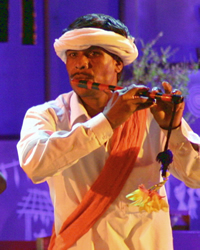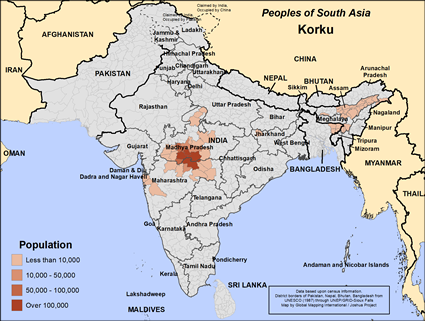Korkus are Adivasis tribals.
These low status people earn very little money. Each week they sell what they can produce through vegetables, the firewood they gather in the forests and other commodities.
In summer, people of Awagad feel an acute shortage of water. Two wells dug by the government were dried up. Tube well, which was dug a year earlier, was not functioning. Once in a while, a wobbling truck loaded with water reaches there. Since the plastic tank setup for emptying the trucks was flown away, the remaining water had to be released to one of the dried well.
They have a small school with two classrooms. Pupils up to fourth standard are supposed to be taught there. After receiving the appointment order and working for two months, the teacher went home and never to be returned. In Awagad there were neither ration depots (fair price shops for the poor) nor public health centers.
Some doctors frequent there seeking patients selling medicines and treat all sicknesses. According to government records, many roads, bridges and buildings were constructed. But all these were alleged to be swept away in the rains.
Wooden pillars erected from the floor are the main base for their houses. The roof is thatched with bamboo frames and handmade tiles. Bamboo mats form the skeleton of the walls, then smeared with mud.
The Korku people come under the broad umbrella of Hinduism. This ancient and flexible religion allows them to worship whatever spirits they want so long as they call themselves Hindu. Hinduism has few if any strict creeds that all must follow.
Korku people need education, better health care and political empowerment to rise above the cycle of exploitation. They need reliable drinking water.
Pray for the Lord to provide for their physical and spiritual needs as a testimony of his power and love.
Pray that the Korku people will have a spiritual hunger that will open their hearts to the King of kings.
Pray for workers who are driven by the love and boldness of the Holy Spirit to go to them.
Pray for a movement to Christ among them to begin this decade.
Scripture Prayers for the Korku in Bangladesh.
Philipose Vaidyar, Copyrighted © Used with permission.
| Profile Source: Joshua Project |












